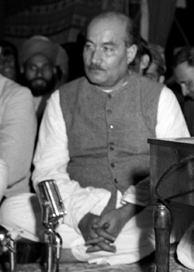
Javed Akhtar is an Indian screenwriter, lyricist and poet. Known for his work in Hindi cinema, he has won five National Film Awards, and received the Padma Shri in 1999 and the Padma Bhushan in 2007, two of India's highest civilian honours.
The Progressive Writers' Association or the Progressive Writers' Movement of India or Anjuman Tarraqi Pasand Mussanafin-e-Hind or Akhil Bhartiya Pragatishil Lekhak Sangh was a progressive literary movement in pre-partition British India. Some branches of this writers' group existed around the world besides in India and Pakistan

Jan Nisar Akhtar was an Indian poet of Urdu ghazals and nazms, and a part of the Progressive Writers' Movement, who was also a lyricist for Bollywood.

Josh Malihabadi popularly known as Shayar-e-Inqalab was a Pakistani Urdu poet, born in Malihabad, British India.
Ali Sardar Jafri was an Indian writer of Urdu language. He was also a poet, critic and film lyricist.
Rudauli is a town, tehsil and a municipal board in Ayodhya district in the Indian state of Uttar Pradesh. Rudauli is 50 km west of the district headquarters Ayodhya.

Akhtar ul Iman was a noted Urdu poet and screenwriter in Hindi cinema, who had a major influence on modern Urdu nazm.
Akhlaq Mohammad Khan, better known by his takhallusShahryar, was an Indian academic, and a doyen of Urdu poetry in India. As a Hindi film lyricist, he is best known for his lyrics in Gaman (1978) and Umrao Jaan (1981) directed by Muzaffar Ali. He retired as the head of the Urdu Department at the Aligarh Muslim University, and thereafter he remained sought after name in mushairas or poetic gatherings, and also co-edited the literary magazine Sher-o-Hikmat.

Shamim Karhani was an eminent Urdu poet ('Shayar') of the 20th century.
Salaam Machhalishahari (1921-1972), or Salam Machhali Sheri, was an Indian Urdu-language poet.
Nazir Ahmed (1915-2008) was an Indian scholar, writer, and teacher of the Persian language. He was honoured by the Indian Government in 1987 with the Padma Shri. He received this award for his contributions to the propagation of Persian Language and literature.
Ale Ahmad Suroor (1911-2002) was an Urdu poet, critic and professor from India. He is best known for his literary criticism. In 1974 he was honoured with the Sahitya Akademi Award by the Government of India for his literary critic work, Nazar aur Nazariya. In 1991 he was also awarded the Padma Bhushan, India's third highest civilian award. He was awarded a special gold medal by the President of Pakistan on the centenary of the birth of Muhammad Iqbal.
Saeed Ahmad Akbarabadi was an Indian Islamic scholar and an Urdu-language author who co-founded the Nadwatul Musannifeen. He served as the dean of the Faculty of Theology in Aligarh Muslim University.
Ansar Harvani was an Indian politician. Harwani opposed the partition of India. He was elected to the Lok Sabha, lower house of the Parliament of India from Fatehpur, Uttar Pradesh as a member of the Indian National Congress.
Abrarul Haq Haqqi was an Indian Sunni Muslim scholar who established Ashraful Madaris in Hardoi. He was a disciple of Ashraf Ali Thanwi.
Hamida Salim (1922–2015) was an Indian author, economist, and educator, writing primarily in the Urdu language. She was the first woman to graduate from Aligarh Muslim University.
Abul Kalam Qasmi was an Indian scholar, literary critic, and a poet of the Urdu language who served as the dean of the Faculty of Arts at the Aligarh Muslim University. He was the editor of Tehzeeb-ul-Akhlaq and authored books such as The Criticism of Poetry. He translated E. M. Forster's Aspects of the Novel into Urdu as Novel ka Fun. He was conferred with the Sahitya Akademi Award in 2009, and the Ghalib Award in 2013.







